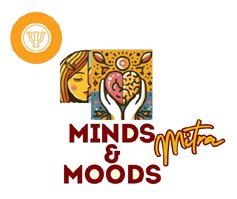Emotional and Behavioral Therapy in Nagpur
Emotional and Behavioral Therapy (EBT) in Nagpur is an essential psychological service designed to help individuals understand, manage, and transform their emotional responses and behavioral patterns. Whether it’s anger management counselling, depression therapy, anxiety treatment, or confidence-building counselling, emotional and behavioral therapy helps restore mental balance and enhance quality of life. Under the guidance of an experienced psychotherapist or mental health counsellor, individuals learn coping mechanisms, emotional regulation, and positive behavioral change.
About RRIMI BODALKAR
RRIMI BODALKAR is a highly respected Senior Psychotherapist and Mental Health Counsellor based in Nagpur. Holding an M.A. in Psychology (Counselling) and PGDMH (Clinical), she is NSDC Certified in Psychometric Analysis and Learning Style Assessment. Specializing in Cognitive Behavioral Therapy (CBT), Rational Emotive Behavior Therapy (REBT), and Dialectical Behavior Therapy (DBT), she offers expertise in depression therapy, anger management counselling, relationship counselling, and personality development counselling. Her compassionate and evidence-based approach has helped countless individuals and families in Nagpur achieve emotional healing and balanced living, making her one of the best psychologists and counsellors in the region.
Understanding Emotional and Behavioral Therapy
Emotional and Behavioral Therapy focuses on identifying unhealthy emotional patterns and replacing maladaptive behaviors with constructive responses. It is often used to treat various conditions such as mood disorders, trauma, negative thinking, stress, and interpersonal conflicts. Therapists employ scientific approaches like Cognitive Behavioral Therapy (CBT), Rational Emotive Behavior Therapy (REBT), and Dialectical Behavior Therapy (DBT) to help clients develop emotional intelligence and behavioral flexibility.
This therapy is suitable for children, adolescents, and adults facing issues like impulsivity, mood swings, low self-esteem, social anxiety, or difficulty managing anger. Many counselling centers in Nagpur provide customized EBT programs led by professional psychologists and counsellors who specialize in holistic treatment.
Symptoms Indicating the Need for Emotional and Behavioral Therapy
- Persistent sadness, irritability, or anger outbursts.
- Difficulty in controlling impulses or managing emotions.
- Excessive worry, fear, or negative thoughts impacting daily life.
- Social withdrawal or communication problems requiring social skills training.
- Behavioral issues in children needing child psychologist intervention or ADHD testing.
- Loss of motivation, burnout, or workplace stress needing burnout counselling or executive coaching.
- Emotional numbness, trauma flashbacks, or distress calling for trauma therapy or PTSD counselling.
Causes Behind Emotional and Behavioral Challenges
- Unresolved trauma or adverse childhood experiences.
- Stressful environments such as demanding academics or workplace pressure.
- Personality disorders or mood disorders left untreated.
- Low confidence or chronic self-doubt needing confidence building counselling.
- Marital issues, relationship stress, or couple conflicts.
- Neurodevelopmental conditions such as ADHD or Autism Spectrum Disorder.
- Bereavement, grief, or sudden life transitions needing grief and loss counselling or life transition counselling.
Procedure of Emotional and Behavioral Therapy
The therapy begins with a detailed assessment by a psychologist or mental health counsellor through psychometric analysis, personality assessment, and neuropsychological testing. This helps identify emotional triggers, behavioral patterns, and cognitive distortions.
Based on the assessment, a personalized therapy plan is developed, which may include:
- Cognitive Behavioral Therapy (CBT): Focuses on restructuring negative thought patterns and promoting healthy behavior.
- Rational Emotive Behavior Therapy (REBT): Helps challenge irrational beliefs and develop rational emotional responses.
- Dialectical Behavior Therapy (DBT): Improves emotional regulation, mindfulness, and distress tolerance.
- Behavioral Therapy: Encourages positive reinforcement and consistent behavior modification techniques.
- Personality Development Counselling: Enhances self-image, social interaction, and confidence.
- Public Speaking Anxiety Treatment and Career Counselling for students and professionals facing performance anxiety.
Therapists often integrate anger management counselling, relationship counselling, or family therapy to create a supportive ecosystem that promotes long-term healing.
Benefits of Emotional and Behavioral Therapy
- Improved emotional control and better stress management.
- Enhanced communication skills and interpersonal relationships.
- Reduction in negative thinking, anxiety, and depression symptoms.
- Better self-esteem and confidence.
- Effective anger management and behavioral discipline in children and adults.
- Increased resilience and ability to handle life transitions positively.
- Support for special needs children through behavior modification and parental guidance.
FAQs on Emotional and Behavioral Therapy
Q1: Who needs Emotional and Behavioral Therapy?
Anyone struggling with intense emotions, frequent anger, anxiety, or unhealthy behavior patterns can benefit from Emotional and Behavioral Therapy. It’s especially useful for children with behavioral challenges or adults facing workplace stress and burnout.
Q2: How long does therapy take to show results?
Most clients notice improvement within 6 to 10 sessions, depending on the severity of the emotional or behavioral issues and the consistency of participation.
Q3: Can Emotional and Behavioral Therapy help children?
Yes. With the support of a child psychologist, therapy can help manage behavioral issues, enhance focus, and improve emotional communication between parents and children.
Q4: What techniques are used in this therapy?
Therapists use techniques from CBT, REBT, DBT, and Behavioral Therapy to address emotional imbalance and encourage healthy coping strategies.
Q5: Is the therapy confidential?
Absolutely. Sessions conducted by certified psychotherapists or mental health counsellors ensure complete privacy and ethical practice.

